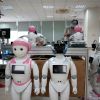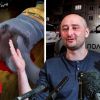-
 +18 +3
+18 +3How White Boy Rick Went From FBI Informant To Detroit Druglord By Age 16
Richard Wershe Jr. was arrested in his home in 1988 with 17 pounds of cocaine. He was 17-years-old. Reporters and the police broadcast the young, baby-face all over the news with headlines that called him the leader of a drug cartel. Wershe, the police claimed, was a dangerous cocaine godfather known to his underlings as “White Boy Rick”.
-
 +10 +1
+10 +1The link between polygamy and war
IT IS a truth universally acknowledged, or at least widely accepted in South Sudan, that a man in possession of a good fortune must be in want of many wives. Paul Malong, South Sudan’s former army chief of staff, has more than 100—no one knows the exact number. A news website put it at 112 in February, after one of the youngest of them ran off to marry a teacher. The couple were said to be in hiding. To adapt Jane Austen again, we are all fools in love, but especially so if we cuckold a warlord in one of the world’s most violent countries.
-
 +22 +3
+22 +3The role of corporations in addressing AI’s ethical dilemmas
The world is seeing extraordinary advances in artificial intelligence. There are new applications in finance, defense, health care, criminal justice, and education, among other areas.[1] Algorithms are improving spell-checkers, voice recognition systems, ad targeting, and fraud detection.
-
 +3 +1
+3 +1The Mirai Botnet Architects Are Now Fighting Crime With the FBI
The three college-aged defendants behind the creation of the Mirai botnet—an online tool that wreaked destruction across the internet in the fall of 2016 with unprecedentedly powerful distributed denial of service attacks—will stand in an Alaska courtroom Tuesday and ask for a novel ruling from a federal judge: They hope to be sentenced to work for the FBI. Josiah White, Paras Jha, and Dalton Norman, who were all between 18 and 20 years old when they built and launched Mirai, pleaded guilty last December to creating the malware that hijacked hundreds of...
-
 +3 +1
+3 +1OxyContin goes global — “We’re only just getting started”
oxyContin is a dying business in America. With the nation in the grip of an opioid epidemic that has claimed more than 200,000 lives, the U.S. medical establishment is turning away from painkillers. Top health officials are discouraging primary care doctors from prescribing them for chronic pain, saying there is no proof they work long-term and substantial evidence they put patients at risk.
-
 +10 +3
+10 +3China Is Detaining Muslims in Vast Numbers. The Goal: ‘Transformation.’
On the edge of a desert in far western China, an imposing building sits behind a fence topped with barbed wire. Large red characters on the facade urge people to learn Chinese, study law and acquire job skills. Guards make clear that visitors are not welcome. Inside, hundreds of ethnic Uighur Muslims spend their days in a high-pressure indoctrination program, where they are forced to listen to lectures, sing hymns praising the Chinese Communist Party and write “self-criticism” essays, according to detainees who have been released.
-
 +16 +2
+16 +2Who Actually Wrote The Bible?
Set aside what religious tradition says, and discover who wrote the Bible according to the scholars who have examined the actual evidence.
-
 +13 +3
+13 +3What we want: Teachers on what they need to solve the crisis in our classrooms
Falling teacher pay. Decrepit school buildings. Textbooks older than we are. It’s no wonder this country is grappling with record teacher shortages – and our colleagues in five states have staged walkouts. But the real victims of this chronic underfunding of education are America’s children.
-
 +16 +4
+16 +4How realistic are sci-fi spaceships?
At more than 60 years into the Space Age, fictional spaceships appear on our screens at a far greater frequency than the real things launch in real life. But that doesn't mean they'll actually fly. When it comes to imagining interstellar travel, the history of spaceflight up until now hasn't given science-fiction designers a whole lot to work with. All we've seen are basic rockets (useful for escaping Earth's gravity well), plane-like space shuttles (useful for re-entering it), Moon modules (the lunar lander), and modular orbital tubes (the International Space Station).
-
 +33 +9
+33 +9Microwave Weapons Are Prime Suspect in Ills of U.S. Embassy Workers
During the Cold War, Washington feared that Moscow was seeking to turn microwave radiation into covert weapons of mind control. More recently, the American military itself sought to develop microwave arms that could invisibly beam painfully loud booms and even spoken words into people’s heads. The aims were to disable attackers and wage psychological warfare.
-
 +9 +2
+9 +2The Dangers of Ignoring Cognitive Inequality
On Sunday 28 April 1996, Martin Bryant was awoken by his alarm at 6am. He said goodbye to his girlfriend as she left the house, ate some breakfast, and set the burglar alarm before leaving his Hobart residence, as usual. He stopped briefly to purchase a coffee in the small town of Forcett, where he asked the cashier to “boil the kettle less time.” He then drove to the nearby town of Port Arthur, originally a colonial-era convict settlement populated only by a few hundred people.
-
 +15 +3
+15 +3Plato’s Theory of Justice
Plato’stheory of justice quite different from and contrary to the justice as we understand it in constitutional-legal terms, can be precisely summed in following two quotes from the Republic: “Justice is having and doing what is one’s own”and “A just man is a man just in the right place doing his best and giving full equivalent of what he receives”.
-
 +7 +2
+7 +2‘We’re a people destroyed’: why Uighur Muslims across China are living in fear
The long read: Gene A Bunin has spent the past 18 months talking to Uighur restaurant workers all over China. These conversations reveal how this Muslim minority feel the daily threat of arrest, detention and ‘re-education’.
-
 +10 +2
+10 +2Declining Majority of Online Adults Say the Internet Has Been Good for Society
Americans tend to view the impact of the internet and other digital technologies on their own lives in largely positive ways, Pew Research Center surveys have shown over the years. A survey of U.S. adults conducted in January 2018 finds continuing evidence of this trend, with the vast majority of internet users (88%) saying the internet has, on balance, been a mostly good thing for them personally.
-
 +4 +1
+4 +1TSA is tracking regular travelers like terrorists in secret surveillance program
Federal air marshals have begun following ordinary US citizens not suspected of a crime or on any terrorist watch list and collecting extensive information about their movements and behavior under a new domestic surveillance program that is drawing criticism from within the agency.
-
 +13 +2
+13 +2Flint Water Crisis Deaths Likely Surpass Official Toll
The death toll in Flint, Michigan, from contaminated water may be much higher than state health officials have acknowledged, an ongoing FRONTLINE investigation has found. The likely killer: Legionnaires’ disease, a severe form of pneumonia caused by the legionella bacteria.
-
 +3 +1
+3 +1Tainted love - BBC News
Liz loved two men. Both were killed in the biggest scandal in NHS history.
-
 +25 +4
+25 +4Dying Alone in Japan: The Industry Devoted to What’s Left Behind
Jeongja Han dumps a drawer of pens and lighters into a plastic garbage bag while her client, a recently widowed woman in her mid-50s who asked not to be named, sits on a stool, watching. The woman’s husband died in a car accident a few weeks ago, leaving her to clean out the spacious two-bedroom apartment they occupied for 30 years in Tokyo’s trendy Ebisu neighborhood. They had no children to lay claim to heirlooms or nostalgia, so her directions to Han were simple: “Get rid of everything.”
-
 +12 +3
+12 +3'Why we had to fake my murder'
The broad-smiling, blond-bearded, would-be killer - Oleksiy Tsymbaliuk - is sitting next to me in my car. Tsymbaliuk, a former Orthodox priest, is the unlikely starting point for the extraordinary tale of how the Ukrainian security service says it faked a murder in order to stop a murder. In doing so, it tried to expose what it says is Russia's involvement in the killing of political opponents. "I am Arkady Babchenko's assassin," says Tsymbaliuk (pictured below) with a laugh as we shake hands.
-
 +16 +2
+16 +2The ugly scandal that cancelled the Nobel prize
In the eyes of its members, there is no more important cultural institution in the world than the Swedish Academy. The members, who call themselves The Eighteen (always in capitals), are elected for life by their peers, and meet for a ritual dinner every Thursday evening at a restaurant they own in the heart of the old town in Stockholm. And once a year, at a ceremony brilliant with jewels and formality, the permanent secretary of the academy hands out the Nobel prize in literature and all the world applauds.
Submit a link
Start a discussion




















